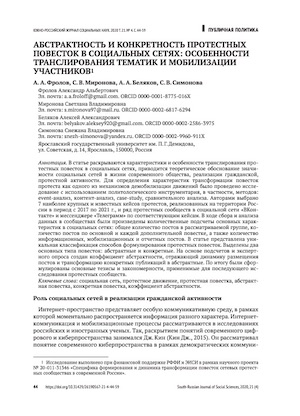Abstract
The article reveals the characteristics and the specifics of broadcasting protest agendas in social networks, as well as substantiates the importance of social networks in the life of modern society and emphasizes the role of realizing the citizens’ protest activity. A study using political science tools (viz., event analysis, content analysis, case study and comparative analysis) was conducted to determine the transformation characteristics of protest agendas as one of the mechanisms for demobilization of the movements). The authors selected seven of the largest and best-known protest cases implemented in Russia between 2017 and 2021 and a number of protest communities in the social network “Vkontakte” and messenger “Telegram”, on the respective cases. In the course of data collection and analysis in the communities, the main characteristics in social networks were quantified: total number of posts in the target group, number of posts for the main and each supplementary agenda, and number of information, mobilization and reporting posts. The article presents a unique classification of ways of formulating protest agendas. There are two main types of summons: abstract and specific. On the basis of calculations and expert interviews, an abstract coefficient has been created which reflects the dynamics of placement of posts and the transformation of specific publications into abstract ones. As a result, the basic theses and patterns applicable to the subsequent study of the protesting communities were formulated.
Keywords
Funding information
The reported study was funded by RFBR and EISR, project number 20-011-31346 “The specifics of the formation and dynamics of network protest communities agendas` transformation in modern Russia”.
References
Абрамов, Р.Н. (2006). Мобильные коммуникационные технологии и повседневность. Рецензия на книгу: Рейнгольд Г. Умная толпа: новая социальная революция. М.: ФАИР-ПРЕСС, 2006. Журнал социологии и социальной антропологии, 9(4), 185–192.
Артамонова, Ю.Д., Демчук, А.Л. (2020). Коннективная идентичность в современном мире. Вопросы философии, 4, 69–79.
Володенков, С.В., Ромашкина, А.Б. (2020). Технологии Интернет-коммуникации как инструмент влияния на функционирование современных институтов власти: актуальные вызовы. Вестник Московского государственного областного университета. Серия: История и политические науки, 1, 33–40.
Кастельс, М. (2016). Власть коммуникации. Москва: Изд. Дом Высшей школы экономики.
Кин, Дж. (2015). Демократия и декаданс медиа. М.: Изд. дом Высшей школы экономики.
Коршунов, И.Л. (2019). Регулирование в Интернете: защита личности или ограничение свободы. Известия СПбГУ, 4(118), 119–125.
Лаклау, Э.О. (2009). О популизме. Вестник Московского университета. Сер. 12. Политические науки, 3, 54–68.
Майкл, Б., Хартвелл, К., Нуреев, Б. «Мягкая сила» — палка о двух концах? Режим доступа https://bricsmagazine.com/ru/articles/myagkaya-sila-palka-o-dvuh-kontsah/
Савенков, Р.В., Щеглова, Д.В. (2018). Теории коллективного поведения и мобилизации ресурсов: развитие концепций анализа политического протеста. Вестник РУДН. Серия: Политология, 4, 555–563.
Соколов, А.В., Палагичева, А.В. (2020). Мобилизация и демобилизация в сетевом политическом протесте. Политическая наука, 3, 266–297.
Dawson A., Innes, M. (2019). How Russia’s Internet Research Agency Built its Disinformation Campaign. The Political Quarterly, 90(2), 245–256.
Heiss, R., Schmuck, D. & Matthes, J. (2019). What Drives Interaction in Political Actors’ Facebook Posts? Profile and Content Predictors of User Engagement and Political Actors’ Reactions. Information, Communication & Society, 22(10), 1497–1513.
Harrison, T., Dumas, C., DePaula, N. et al. (2017). E-petitioning and Online Media: The Case of #BringBackOurGirls. In Proceedings of the 18th International Conference of the Digital Government Society (pp. 11–20). NY: Staten Island.


